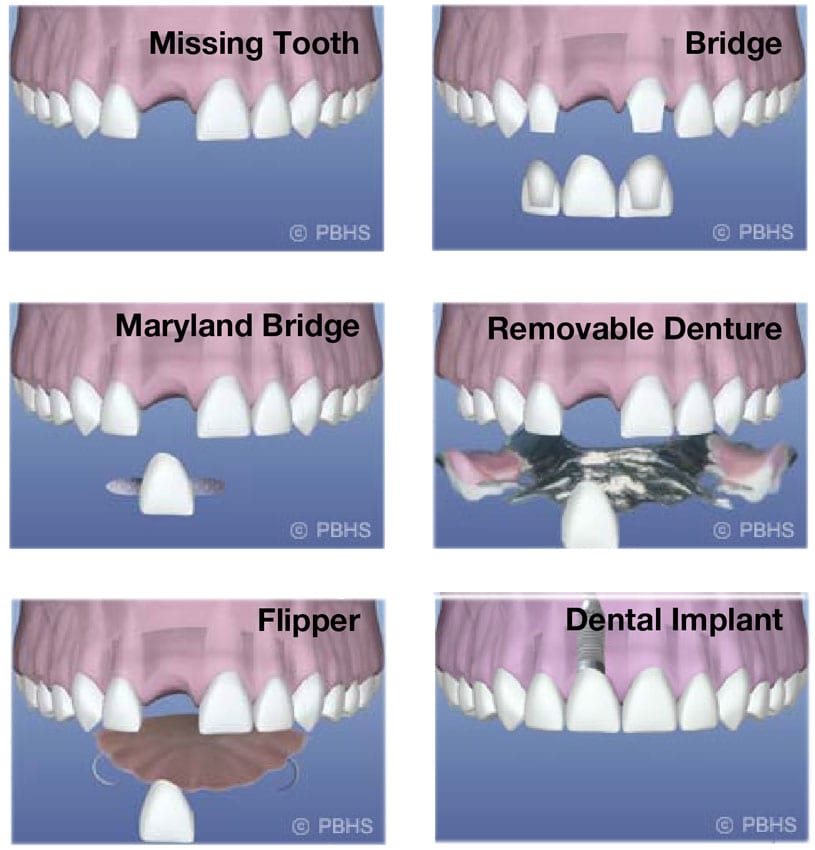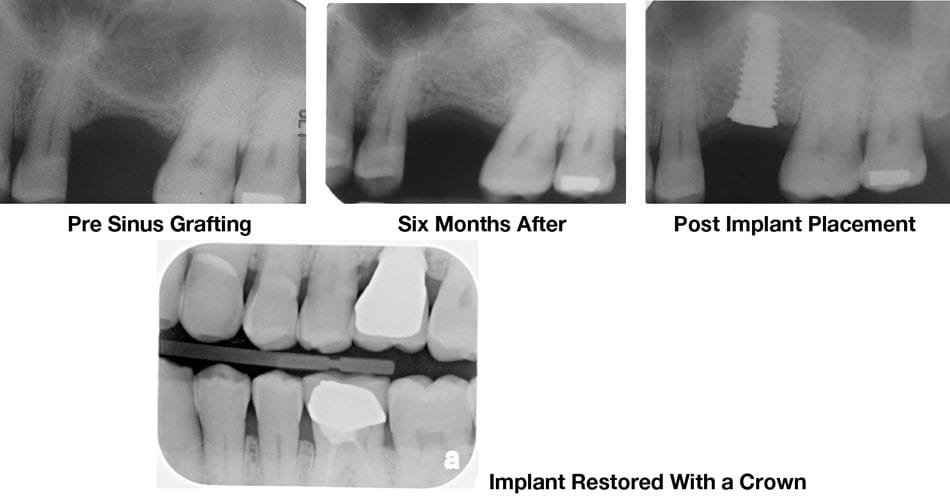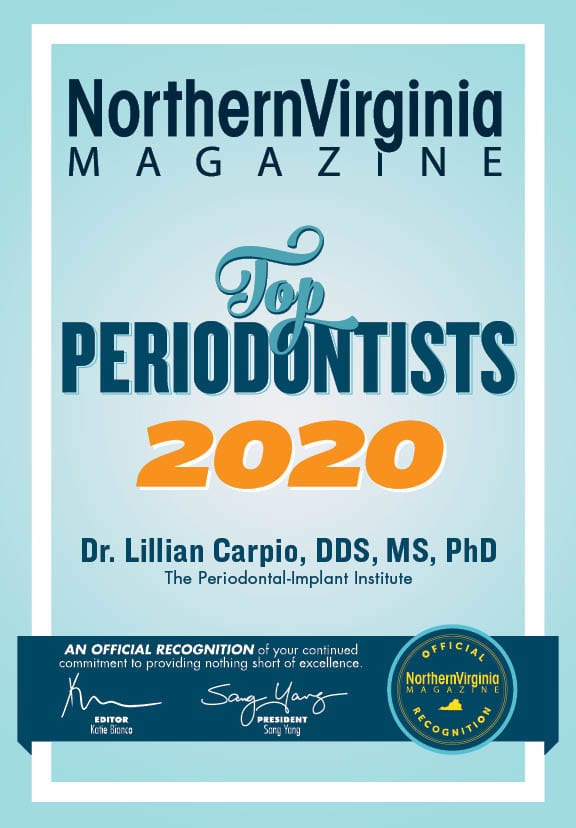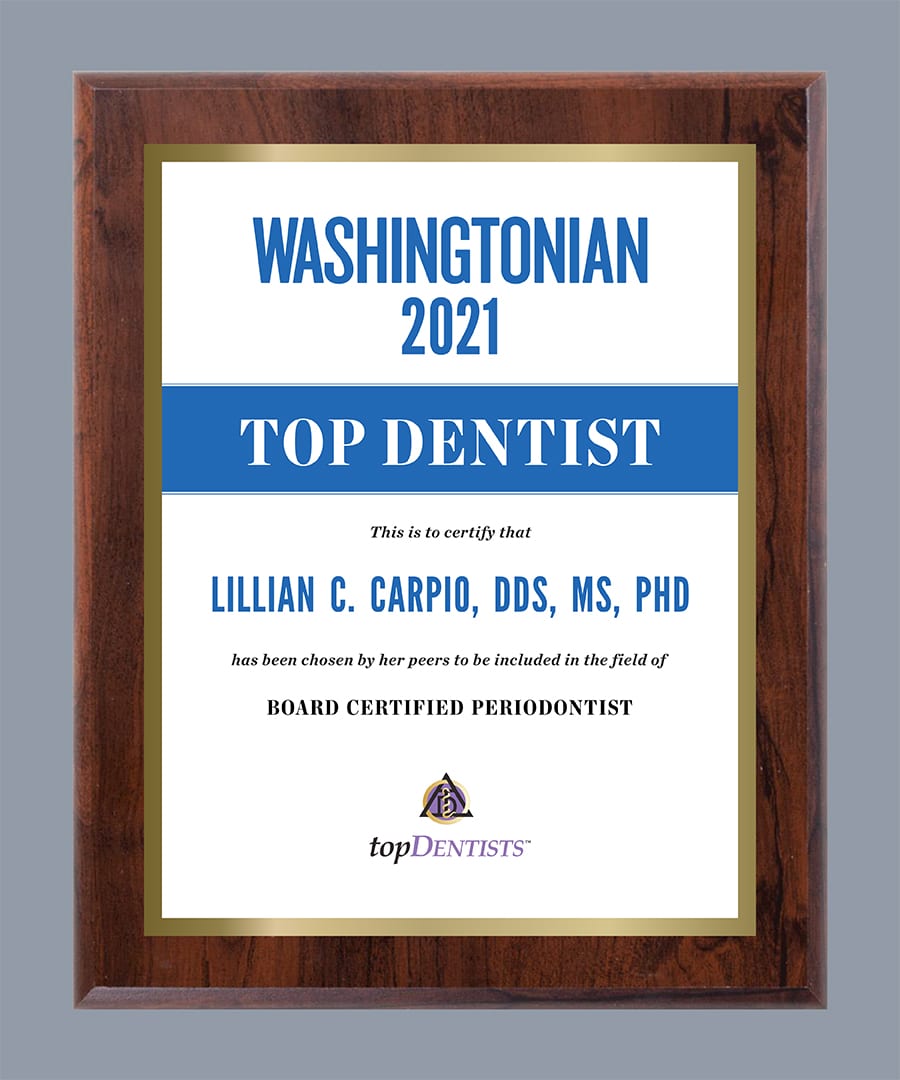
Dental Implants
Dental implants are titanium fixtures that replace the roots of natural teeth. The dental implant is the strongest and most stable method of tooth replacement. It is the closest thing to a natural tooth. These fixtures are solidly attached into the jawbone. Later, a general dentist will put a crown over the implanted artificial root, and the dental implant will then look like a natural tooth. Dental implants are also used as anchors for partial dentures and full dental dentures. Dental implants are made of highly pure titanium which offers the patient no allergic reaction or health hazards. Titanium is a biologically friendly material. There are two parts to a dental implant which simulate the strong holding ability of the tooth root. The main part of the dental implant is embedded in the jawbone. The second part is a post that protrudes above the jawbone and gum line, to provide a fixed point to attach the tooth restoration that will simulate the crown. To replace one tooth, a single post is required. For the replacement of multiple teeth, several implant posts are used.

- Advantages of Dental Implants
- Success Rate of Dental Implants
- Dental Implant Placement
- Indications for Dental Implants
- Choosing Dental Implants
- Dental Implants versus Dentures
- Dental Implant Costs
- Are You a Candidate for Dental Implants?
- Why Replace Your Missing Teeth?
- Preventing Jawbone Loss
- What is bone grafting associated with implants?
- What should I expect during surgery?
Advantages of Dental Implants
Below is a list of the many benefits associated with dental implants:
- If a patient is looking for the most natural appearance possible, dental implants are an excellent option. They work and feel like natural teeth.
- Dental implants provide stability and are excellent for speaking, eating, and smiling.
- When dental implant surgery is performed, a patient can avoid other procedures like having to cut down existing healthy teeth for a bridge.
- Dental implants can help completely eliminate issues with pain that may be derived from improperly fitting dentures and appliances.
- Dental implants are one option of tooth replacement that also helps preserve the patient’s jawbone.
- Dental implants help maintain the natural shape of a patient’s face.
- Dental implants can make an individual look and feel more attractive.
- Dental implants do not have the negatives associated with other dental appliances. There is no fear that dentures will move around, loosen, or fall out.
- Dental implants feel like natural teeth. This means maximized comfort for the patient.
- Chewing becomes more natural with dental implants, particularly when compared to other appliances.
- Removable appliances like dentures can move, and irritate the gums and mouth, causing pain and sores. This problem is completely eliminated with dental implants.
- Having to remove dentures can be embarrassing. With implant dentistry you do not have to be seen without your teeth.
- With dental implants the need for denture adhesives is eliminated.
Success Rate of Dental Implants
Dental implants today are very successful. The success rate ranges from 94 to 98 %. In non-smokers and healthy patients, and if they keep regular dental visits and wear a night guard for protection if they clench their teeth, then the success rate is even higher nearing 100 %. Dental implants are made of titanium, a highly durable material. With proper oral hygiene measures and regular dental checkups and cleanings, dental implants can last throughout a patient’s natural lifetime.
Dental Implant Placement
A patient must be completely evaluated by a periodontist before dental implant surgery can be considered. Not every individual is a good candidate for dental implants, and a patient must be assessed to determine if restorations supported by dental implants are an appropriate option. Once a patient has been approved for dental implant surgery, a plan will be implemented by the patient’s general dentist and Dr. Carpio. Dental implant surgery is performed under local anesthesia, and the procedure typically lasts between one to two hours depending on the number of implants placed. Implants need to heal for approximately 3-4 months for the mandibular jaw bone, and 5-6 months for the maxillary bone. Healing might take longer if bone grafting was performed prior, or at the time of implant placement.
Indications for Dental Implants
Dental implants are recommended for replacing missing teeth. Other options for patients include fixed bridges, partial dentures, and full dentures. After the patient is evaluated by a general dentist, he/she can discuss the patient’s options, determine if the patient is a good candidate for dental implant surgery, and whether implant supported restorations/dentures are appropriate.
Choosing Dental Implants
At the Periodontal-Implant Institute we offer our patients Biomet3i dental implants which are available on today’s market. Your general dentist will inform you of the best dental implant options for you, and will work with Dr. Carpio on your behalf so that your treatment is comprehensive and successful. To read more information about Biomet3i implants, please click here.
Dental Implants versus Dentures
Dental Implants are an ideal solution to missing teeth. People with missing teeth are nowadays looking for a better solution than dentures.
Dentures have been the traditional way to replace missing teeth. Dentures are made from acrylic, metal, and/or porcelain. Although modern plastics allow us to provide dentures that are a little more comfortable, many patients still complain from denture pain or sore spots, especially those patients with a full set of lower dentures. Below are alternatives to replacing a missing tooth.

Other considerations make dentures a poor solution to missing teeth. Even with today’s technology, there is still a problem of denture slippage and discomfort. Chewing efficiency is markedly decreased with dentures. Dental implants can restore the lost chewing efficiency.
If you have missing teeth, you want a solution that mimics your natural teeth. That is why dental implants are the best alternative to dentures.
Dental implants are very strong because of the method of placement. There is no problem with slippage, which means that you can eat and speak with comfort and confidence.
Dental Implant Costs
Dental implants can be higher in costs compared to conventional dentures. This is in part due to the longevity and durability associated with dental implants. Dental implants last far longer than dentures and other removable appliances. When comparing an implant supported crown to a tooth replaced with a 3-uni bridge, the costs are very comparable.
Are You a Candidate for Dental Implants?
You will need to undergo an evaluation by your general dentist and Dr. Carpio to help determine whether or not you are a good candidate for dental implant surgery. If dental implants are right for you, your dentist will have Dr. Carpio evaluate you for implant surgery. Dr. Carpio will keep your dentist informed and provide him/her with updates on your treatment and on when your implant(s) will be ready to be restored. Dr. Carpio’s office works with your dentist to ensure that you get the appropriate treatment and care. Please contact our office for more information.
Why Replace Your Missing Teeth?
After experiencing tooth loss, one can become self-conscious about smiling. Missing teeth can have a major impact on health. After a tooth is lost, the area in the jaw bone will no longer need to provide support because the root structure of the tooth is no longer present. As a result, the jawbone begins to lose strength and firmness. This loss of jawbone is treatable. For patients who have experienced this difficulty, it is possible that a bone graft will correct the problem.
When a tooth or several teeth are lost, one tends to favor one side for chewing. As a result, problems may arise from the side that is being used due to excessive load. Ideally, we should use both sides for chewing. Teeth might also shift into missing spaces, changing the bite.
Preventing Jawbone Loss
Bone loss around teeth refers to loss of jaw bone around the roots of teeth. Jaw bone loss, also can occur in the jaw bone in areas that are usually not directly associated with teeth. Sometimes both kinds of bone loss occur in the same jaw. For most people, bone loss is often associated with a disease called osteoporosis. Osteoporosis is a condition of decreased bone density which is most common among post-menopausal women, and can cause spinal deformity, and hip fractures. Although density changes occur in the jaw bones as we age. A major cause of teeth bone loss is periodontal infections (gum disease) or infections that affect the nerve of a tooth, as occurs with an abscessed tooth. Usually teeth bone loss occurs at the site of the infection. Sometimes, teeth bone loss will occur when there is no infection. Teeth can also cause dental bone loss. When teeth cause dental bone loss, the bone loss appears not to be connected to any teeth, even though it is. This kind of dental bone loss is usually caused by infections that are associated with previously extracted teeth. When a tooth is extracted, the residual bone in the extraction site undergoes bone remodeling and some collapse.
Dental implants can prevent jaw bone loss. The base of the dental implant (the post) serves as a substitute for the missing tooth root structure.
Dental bridges and partial dentures do not prevent bone loss. Dental implants are the only tooth replacement solution that can protect your dental health by simulating your natural tooth and tooth root structure.
What is bone grafting associated with implants?
Successful placement of implants depends on the presence of bone of sufficient quality and quantity. This is not the case in every patient. A lack of bone is usually related to local factors such as how the gums healed after a tooth extraction, rather than any general medical condition.
It was previously thought that in areas where there was insufficient bone it was not possible to place dental implants. Great advances have been made in surgical procedures that aim at increasing the amount of bone needed for placing dental implants. These procedures can use endogenous bone (i.e. belonging to the patient) or a range of bone substitutes or a combination of both. These “grafting” techniques are simple and are carried out either before placing a dental implant, or at the time of implant placement. For areas where there is significant lack of bone, more complex grafting procedures can also be carried out to restore bone volume.
Dr. Carpio is experienced in bone grafting techniques including sinus augmentation procedures, in which bone volume is created in the upper maxillary posterior sites, where typically there is less bone available for placing dental implants.

What should I expect during surgery?
The procedure is normally carried out under local anesthesia. The procedure ranges between 1 hour to 3 hours, depending on the complexity, number of dental implants, or whether bone grafting is required. After the surgery, there will be some discomfort, swelling and/or bruising but with the appropriate medication, all these post-operative events can be well managed. It is important to point out that different people heal at different rates. This depends largely on the complexity of each individual case, health factors, etc.
After the surgery, you might need to take a couple of days off work for recovery. Each case will be different and will require individual assessments for establishing treatment needs.








